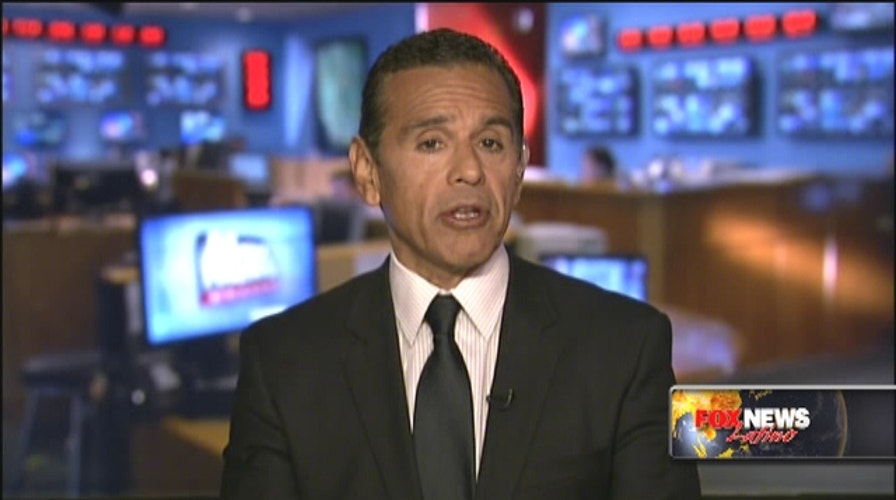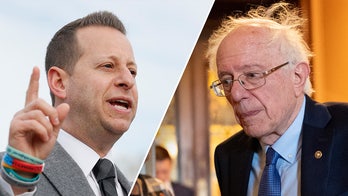Villaraigosa: Clinton realizes Latinos are road to WH
Former Los Angeles Mayor Antonio Villaraigosa told Fox News Latino on Tuesday that Hillary Clinton realizes that Latinos are part of the road to the White House.
Presidential candidate Hillary Clinton on Tuesday will embark on her most significant outreach yet to Latinos in her campaign during a stop in Nevada, where they lavished her with love in the 2008 primaries.
The former Secretary of State plans to call for undocumented immigrants to have a chance to legalize their status, and will say that a pathway to citizenship must be part and parcel of any comprehensive immigration reform legislation.
Clinton plans to discuss her ideas for reforming immigration at Rancho High School in Las Vegas, where Latinos comprise about 71 percent of the more than 3,000 students. Her campaign says that she will speak to various students about how harsh and ineffective immigration policies have adversely affected them and their families.
Hillary Clinton has been for a path to citizenship for a very long time...she supports bringing people out of the dark and into the light. She knows the Latino agenda is the American agenda.
After years of delays in Congress, Latinos and immigration activists are watching Clinton's statements closely for signs of how she might break a legislative logjam on immigration and whether she would extend President Barack Obama's executive actions to shield millions of immigrants from deportation.
Clinton will be delving into one of the most contentious issues of the day, and one that figured prominently in the 2008 and 2012 presidential elections, and which likely will grab the spotlight in the 2016 race.
Clinton typically has enjoyed strong Latino voter support, trouncing Barack Obama among Hispanics in the 2008 Democratic primaries, where Latinos supported her by an overall margin of almost 2 to 1. Nevada Latinos were among her most enthusiastic supporters, preferring her over Obama in the state’s primary 64 to 26 percent.
This time around, Latinos seem to be just as supportive of Clinton, despite allegations dogging her campaign recently regarding the candidate’s handling of official government emails as well as donations to the Clinton Foundation while she was Secretary of State. Nevada is only one of two states with a Latino governor, Republican Brian Sandoval, who has made efforts to woo Latinos and some hope can help a Republican candidate attract Latino voters.
Political experts say that Clinton’s appeal to Latinos is multi-faceted.
She has been diligent about staffing her campaign with Latinos, including Amanda Renteria, who is Clinton’s national political director. She also no doubt benefits from the positive views that many Latinos hold of former President Bill Clinton, whose visit to Puerto Rico years ago drew one of the biggest crowds he had ever seen.
Of all the people – including Latino GOP senators Ted Cruz of Texas and Marco Rubio of Florida – who have declared that they are running for president, only Hillary Clinton offers a Spanish-language campaign website.
“Without question, anyone who goes up against Hillary will have to fight as far as getting Latino voters,” said Fernand Amandi, a Democratic pollster based in Florida. “With Hispanic voters, she gets it. It’s a hallmark of her campaigns. She’s always understood and valued the role of Hispanics in the United States.”
“She’s starting as the presumptive favorite” in the Democratic camp and among Latinos, Amandi said. “She’s going to have a tremendous advantage when it comes to garnering the lion’s share of the Hispanic vote. It’s because of who she is, her history with the community, her husband’s record with Latinos, and the fact that most Latinos lean Democratic.”
Several Latino advocacy groups released public statements indicating they'll be listening closely to Clinton's remarks about immigration.
"Local immigrant leaders and advocates have high hopes that Clinton will embrace a progressive policy platform on the issue that includes a roadmap for comprehensive immigration reform and commitment to defending and expanding the deferred action programs created by President Obama," said a statement by the Alliance for Citizenship.
Her seeming popularity shows there could be a limit to how taken Latinos seem to be with the fact that two Latinos are running for president, experts say.
Cruz’s staunchly conservative views on immigration and his firebrand style seem to turn off many Latinos.
He recently engaged in a Latino outreach effort by doing a question-and-answer session with the U.S. Hispanic Chamber of Commerce in Washington D.C.
Cruz comfortably fielded both soft and pointed questions posed by the chamber’s president, Javier Palomarez, about immigration and the senator’s YouTube campaign announcement in Spanish, which – unlike his English-language ad – avoided Obamacare and providing a path to legal status for undocumented immigrants (which Cruz opposes but many Latinos support).
As for Rubio, a Latino Decisions poll of 4,200 Hispanic voters last year showed 31 percent having a favorable view of him. In his home state of Florida, Rubio a polls showed 39 percent of Latinos viewing him favorably, and 42 percent unfavorably.
Clinton beat Obama among Latino voters – 59 to 30 percent – in the Florida primary in 2008.
Former Los Angeles Mayor Antonio Villaraigosa, seen as a potential gubernatorial candidate or congressional representative someday, told Fox News Latino on Tuesday that Clinton realizes that Latinos are part of the road to the White House.
"We're the fastest growing demographic group," Villaraigosa said, "more and more in our schools, when you look at the faces of children, they're Latino. She knows the Latino agenda is the American agenda."
Renteria, Clinton’s national political director, said Latinos know the former Secretary of State’s attention to their community is not a sudden election gimmick. As Clinton supporters have for years noted, as far back as 1972, the candidate worked in Texas to register Latino voters for George McGovern’s unsuccessful presidential campaign.
"Throughout her career Hillary Clinton has fought to strengthen Latino communities by keeping their families together and working to give them the voice they deserve in our political process,” Renteria said in an email to Fox News Latino. “From starting out registering Latino voters in Texas, to her fight for comprehensive immigration reform – Latinos know she’s always been on their side and will work hard to earn their vote throughout this campaign.”
Clinton has had her contentious moments with Latino groups.
Last year, young undocumented immigrants and their supporters showed up at several of her public events, heckling Clinton for comments she made about how unaccompanied minors who had arrived at the U.S.-Mexico border from Central America should be turned back.
“We have to send a clear message,” Clinton said when asked at a public forum about what the U.S. should do with the children. “Just because your child gets across the border, that doesn't mean the child gets to stay. So, we don't want to send a message that is contrary to our laws or will encourage more children to make that dangerous journey.”
The advocacy group United We Dream, which pushed for the kids to be given political asylum, charged that Clinton’s remarks were “at odds with the realities faced by too many of our families.”
And in the 2008 primary, Clinton seemed adrift when asked about whether undocumented immigrants should be allowed to obtain driver's licenses. When another candidate raised the issue, Clinton said it seemed logical that they be allowed to drive, but that should could not support it. Her rivals quickly seized on the conflicting answer, accusing her of being intentionally ambiguous.
This time, having been bruised by such positions in the past, Clinton has come out firmly in favor of such things as driver's licenses and other policies to lend a helping hand to undocumented immigrants.
In Nevada, where Latinos are 25 percent of the population, Clinton’s campaign says she will talk about how current U.S. immigration policies – which include a high rate of deportations – are leading to the separation of families.
Although she’s beating Jeb Bush in polls of Latino voters in a hypothetical matchup, some experts say it would be premature to write off the former governor’s chances of gaining a respectable share of the bloc.
“Jeb is the only Republican who might make it competitive,” Amandi said. “In politics there are never any guarantees, but he gives Republicans the best potential chance of defeating her.”
Bush speaks fluent Spanish, has taken more moderate positions on things such as immigration and educational policies. His wife, Columba, is Mexican, and the couple made a point of speaking Spanish to their children when raising them. Bush also lived in several Latin American countries, giving him an understanding of different Latino cultures, experts say.
Alfonso Aguilar, a GOP analyst and director of American Principles in Action’s Latino Partnership, thinks Rubio can garner support from Latinos if he makes himself known to them on a national level, and expands his support in the community beyond just fellow Cuban-Americans.
Aguilar said that Rubio may be able to brush off the stigma that Republicans generally have among Latinos as being hostile to immigrants because he was a core part of a bipartisan Senate comprehensive immigration reform bill in 2013 that, among other things, called for allowing certain undocumented immigrants to legalize their status.
Susan McManus, a political science professor at the University of South Florida, said to the Washington Times that Latinos may become excited about helping one of their own make history.
“There will be a number of Hispanics who are drawn to the idea of breaking a big barrier down,” she said, “and that will grab some people’s attention.”
The Associated Press contributed to this report.





